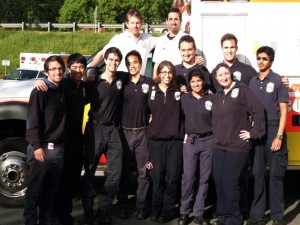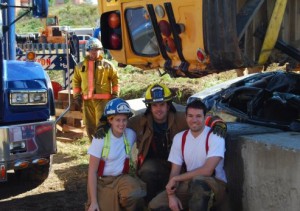After a heart attack or a car accident, you might recall the hospital nurse you saw almost every day, the doctor who spent so much time explaining your surgery or the physical therapist who pushed you to your limit.
But before any of that happened, there were emergency responders who cared for you at the very beginning and got you to the hospital.
May 19-25 is National Emergency Medical Services (EMS) Week, where hospitals, rescue squads and other organizations around the country recognize the hard work of emergency responders. Many are volunteers and give up free time or even sleep to be there when we need them the most.
A “Surrogate Family”: Volunteering for CARS
Every Sunday night, Michael Hanshew works a 13-hour volunteer shift with Charlottesville-Albemarle Rescue Squad (CARS).

He’s a duty officer, meaning he supervises the other volunteers, ensures every EMS call gets a response and fills in wherever he’s needed. He can sleep but wakes up every time a 911 call goes out, or he’s needed for a response, or the phone rings with a question. He gets off at 6:30 a.m. Monday. Then he begins his job as a director of quality assurance and compliance in UVA’s radiology department.
Mondays can be rough. But Hanshew, who began volunteering while he was a UVA student 15 years ago, can’t imagine any other life. At one point, he lived in Northern Virginia and drove to Charlottesville every week for his volunteer shift. A lot of his friends are CARS volunteers, and he says the experience helped him get his job at UVA.
You begin volunteering “because you’re interested in medicine and healthcare, and what sustains you through it, I think, are the personal connections with your crew members, and those long nights you’re pulling through together,” he says.
For Sarah Ferrell, who also began volunteering as a UVA student, CARS became her “surrogate family for an undergrad that was away from home.” She now works in emergency services at UVA and has been volunteering for CARS for seven years.
Both Hanshew and Ferrell are intermediate-level EMTs, which is one step below the highest level, paramedic. This level means they can perform a wide scope of interventions and treatments, and it’s a common level at CARS.

Ferrell, who was the deputy chief of night operations at CARS until December, often volunteered almost forty hours per week in that role. Even though her life now as a UVA employee is far busier, she still runs an average of one shift per week with the agency. The camaraderie with the other volunteers is her favorite part, but the variety of calls and success stories also keep her coming back, such as a cardiac arrest patient in his 30’s.
“We got there, worked with the fire department, resuscitated him, and he walked out a couple of weeks later from the hospital with no deficits,” she says.
EMS at UVA
The Health System’s emergency medical services include:
- Pegasus Air & Ground, UVA’s ambulance and flight helicopter
- NETS, the Newborn Emergency Transport System, which transfers babies and children from other hospitals to UVA
- Medic-5, a team of 36 EMS providers
Medic-5 handles emergencies near the hospital and transports patients from one facility to another. For example, if someone developed chest pains at Northridge Medical Park, four miles from the hospital, the EMTs would take the person to the hospital. EMTs also transport UVA patients to other facilities, such as nursing homes.
EMS employees can perform different skills based on their level of training, but all are capable of lifesaving interventions such as performing CPR, using an AED or giving oxygen. About half of UVA’s team are paramedics, the highest level EMS provider.
UVA also works with local EMS providers to track UVA patients and review their care from the initial 911 call to the time they’re discharged from the hospital. And when there’s a particularly traumatic incident like a child’s death, UVA works with fire department and rescue squad volunteers who were affected.
Interested in EMS?
The Charlottesville-Albemarle Rescue Squad is looking for volunteers and holds EMT-Basic courses several times a year. Learn more about volunteering for CARS.